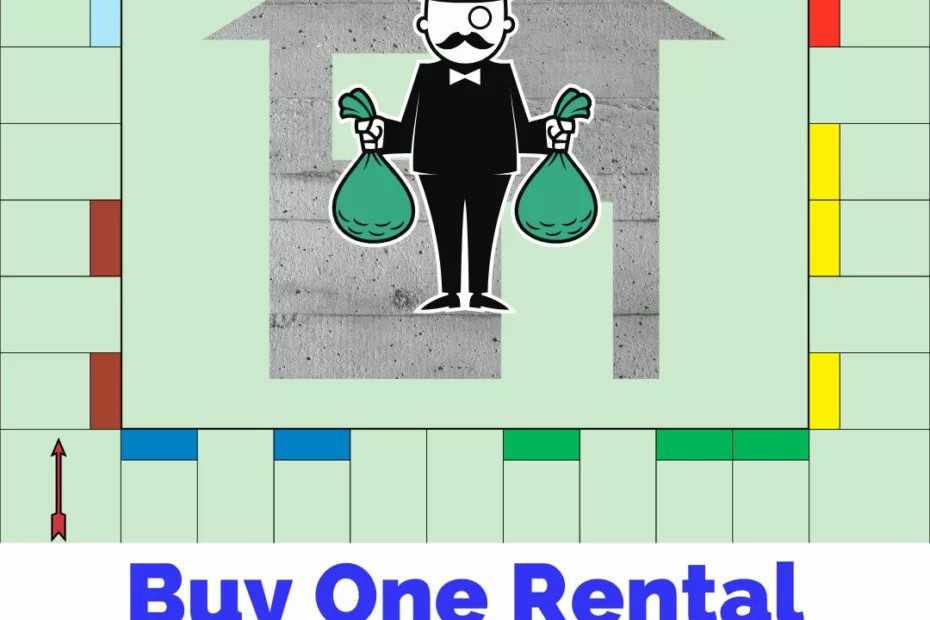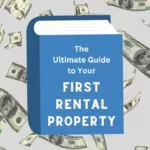Question: What happens if you buy one rental property a year for 20 years?
Answer: You’ll get rich.
If you buy a single rental property every year for 20 years, you will become a millionaire. Using the national average for rents and home values, you would have a monthly income of nearly $14,000 and a net worth of over 3 million dollars.
These houses would initially have mortgages but will be paid off over the next 15 years. After all the mortgages are paid, you would have a monthly income of $23,000 and a real estate portfolio worth almost 4 million.
This is not a get-rich-quick scheme; it takes patience and perseverance. This is a long-term investment. Buy just one rental property per year, let the equity build, and in the long run, you will build wealth and gain financial freedom.
Results of Buying a Rental Property Every Year
Before we jump into the details, let’s take a look at the results of buying one rental house each year for years. At year 15, you will reach your peak mortgage payment, and from that point forward, the mortgage will begin being paid off. The combination of leverage and time is the main reason investment properties are so lucrative.
In year 20, you stop buying houses. At this point, you should have a monthly income of about $13,000. Couple this with over $3 million of equity in your rental property portfolio, and you are on your way to being wealthy.
In the 34th year, all the houses will be paid for. At this point, you should be taking in over $23,000 a month in rental income profit, and your net worth will be over $4 million dollars.
Why Buy Rental Property as an Investment?
Single-family homes are a great investment. Most community banks will make a rental property loan allowing real estate investors to use leverage to amplify their wealth creation. For this reason, rental property investment is one of the best real estate investing techniques.
Investing in real estate comes with many tax benefits, and it’s an easily understood investment strategy. Both repair expenses and mortgage interest are generally tax deductible, and depreciation expenses can offset any of the profit you earn.
Owning a real estate investment property is a hedge against inflation. Home prices generally rise against inflation rental rates, raising the net worth of a rental property investor. In Addition, rental rates usually increase in inflationary times, increasing a landlord’s income to combat inflation’s effect on purchasing power.
How Our Model Determines Rent and Property Value
The actual result of buying a rental property each year depends on the properties you pick, the region in which you are investing, and how well you manage your properties. To calculate the results, we must make assumptions that may not apply to all properties. This will simplify the model and produce a baseline value that can be adjusted based on a specific situation.
The model will be tightly based on the rent received. Therefore we need a way to estimate the monthly rent. We will assume each property rents for the US national average rent of $1,978. This rent is considered very low in some areas, while it’s incredibly high in others. You can adjust this for your average after you fully understand the approach.
This model will assume that each property has a value of $197,800. We arrived at that value by applying the 1% rule, which states that the market rent for a property is roughly 1% of the value of that property. We considered using the national US home value of $357,319 but ruled that out because it includes all homes and is not limited to rental properties. We feel that the 1% rule produces a better indicator of the value of your rental houses, but keep in mind that using the larger number would give you more equity.
How Inflation and Appreciation are Handled
Any attempt to predict inflation and property appreciation over multiple decades would likely produce erroneous results. Therefore, we will not attempt to factor in these possible values. Over time, inflation will likely occur, but rents and property values will also increase and offset this effect. Given that spending power is directly correlated with inflation and market appreciation, it would be safer to ignore these factors than to attempt to predict them long-term.
Rents generally rise with inflation, but we cannot know the precise amount that will occur over the next 20 years. Currently, the Fed is acting to curtail inflation, and many predict this will result in a recession. For this reason, this article will ignore both inflation and rising rents, which means your actual income will likely be higher than that predicted by the report. Remember that the dollar’s spending power decreases during inflation and would be offset by the increased rents collected. This is a wash; you should compare the predicted income in today’s dollars, and inflation should take care of itself.
In general, Real Estate values tend to appreciate over time. However, it is impossible to predict the level of appreciation over 20 years. The article will ignore the effects of appreciation and assume the cost of each house, and the value of the houses, do not change over time. As with the rent above, we will ignore changes in property values, and appreciation should take care of itself.
Assumptions for Rental Property Acquisition
The amount you pay for a rental house is the #1 factor determining your success. As a real estate investor, you aim to purchase properties selling at a discount to market value. The amount you pay for a rental house should never exceed 50 times the monthly rent. Paying this amount allows you to handle operating expenses, capital improvements, and debt servicing.
The research in this article will assume that you have purchased the property at a maximum of 50 times the monthly rent. If you only learn one thing about investing in rental houses, it should be the 50 times rent rule. The best way rental property owners succeed in real estate investing is to get a good deal on every property.
Other than my first three properties, which were a mistake, I have purchased all my properties for less than 50 times the rent. So remember, when you buy one rental property a year, you can’t buy just any property at any price.
This article assumes that you will use leverage to purchase the rental house. Each year you will be buying a new rental home, using a mortgage with a 25% downpayment. A downpayment of 25% is common, and some banks now ask for a 30% down payment. This loan will be a 15-year loan with an interest rate of 8%, the current rate for commercial loans secured by real estate.
Analyzing the Data over 34 Years
In the first year, you will buy your first rental property for a purchase price of $98,900, which is 50 times the US national average for rent. You will borrow 75% of this number, which is $74,175, and your monthly payment will be $709.
You should expect a long-term operating expense ratio of 40% of the rent, which includes property taxes, homeowners insurance, and maintenance costs. This leaves $1,187 for debt servicing. After making your monthly mortgage payment, you will be left with $478 positive cash flow each month from your first investment property.
In the second year, the balance on the loan for the first property is loan is $71,506. During that year, you purchase your next property with the same numbers as in year one. During this second year, your cash flow is $956, resulting in a total loan balance of $140,122 at the start of the third year.
You can see how your cash flow snowballs, and by the 5th year, the rentals are producing enough income to fully cover your down payment on the following year’s property.
As you enter the 16th year, some of your mortgages are being paid off. You continue purchasing a single house yearly until you reach 20 years and stop. As you enter the 21st year, you will have a monthly cash flow of $13,812 and $3,331,822 equity in your portfolio.
From this point forward, you will not add a new rental property. Your loans are being paid off, and your equity is increasing. The table below shows the effect of this approach over time.
| Year | Number of Properties | Cash Flow | Equity | Rent Collected | Operating Expenses | Mortgage Payment | Start of Year Mortgage Balance | Portfolio Vale |
| 1 | 1 | $478 | $197,800 | $1,978 | $791 | $709 | $0 | $197,800 |
| 2 | 2 | $956 | $324,094 | $3,956 | $1,582 | $1,418 | $71,506 | $395,600 |
| 3 | 3 | $1,434 | $453,278 | $5,934 | $2,374 | $2,127 | $140,122 | $593,400 |
| 4 | 4 | $1,912 | $585,592 | $7,912 | $3,165 | $2,835 | $205,608 | $791,200 |
| 5 | 5 | $2,390 | $721,295 | $9,890 | $3,956 | $3,544 | $267,705 | $989,000 |
| 6 | 6 | $2,868 | $860,671 | $11,868 | $4,747 | $4,253 | $326,129 | $1,186,800 |
| 7 | 7 | $3,346 | $1,004,022 | $13,846 | $5,538 | $4,962 | $380,578 | $1,384,600 |
| 8 | 8 | $3,824 | $1,151,679 | $15,824 | $6,330 | $5,671 | $430,721 | $1,582,400 |
| 9 | 9 | $4,302 | $1,303,999 | $17,802 | $7,121 | $6,380 | $476,201 | $1,780,200 |
| 10 | 10 | $4,780 | $1,461,370 | $19,780 | $7,912 | $7,089 | $516,630 | $1,978,000 |
| 11 | 11 | $5,257 | $1,624,210 | $21,758 | $8,703 | $7,797 | $551,590 | $2,175,800 |
| 12 | 12 | $5,735 | $1,792,974 | $23,736 | $9,494 | $8,506 | $580,626 | $2,373,600 |
| 13 | 13 | $6,213 | $1,968,153 | $25,714 | $10,286 | $9,215 | $603,247 | $2,571,400 |
| 14 | 14 | $6,691 | $2,150,280 | $27,692 | $11,077 | $9,924 | $618,920 | $2,769,200 |
| 15 | 15 | $7,169 | $2,339,931 | $29,670 | $11,868 | $10,633 | $627,069 | $2,967,000 |
| 16 | 16 | $8,356 | $2,537,731 | $31,648 | $12,659 | $10,633 | $627,069 | $3,164,800 |
| 17 | 17 | $9,543 | $2,735,531 | $33,626 | $13,450 | $10,633 | $627,069 | $3,362,600 |
| 18 | 18 | $10,730 | $2,933,331 | $35,604 | $14,242 | $10,633 | $627,069 | $3,560,400 |
| 19 | 19 | $11,916 | $3,131,131 | $37,582 | $15,033 | $10,633 | $627,069 | $3,758,200 |
| 20 | 20 | $13,103 | $3,328,931 | $39,560 | $15,824 | $10,633 | $627,069 | $3,956,000 |
| 21 | 20 | $13,812 | $3,331,822 | $39,560 | $15,824 | $9,924 | $624,178 | $3,956,000 |
| 22 | 20 | $14,521 | $3,338,082 | $39,560 | $15,824 | $9,215 | $617,918 | $3,956,000 |
| 23 | 20 | $15,230 | $3,348,251 | $39,560 | $15,824 | $8,506 | $607,749 | $3,956,000 |
| 24 | 20 | $15,939 | $3,362,936 | $39,560 | $15,824 | $7,797 | $593,064 | $3,956,000 |
| 25 | 20 | $16,648 | $3,382,816 | $39,560 | $15,824 | $7,089 | $573,184 | $3,956,000 |
| 26 | 20 | $17,356 | $3,408,652 | $39,560 | $15,824 | $6,380 | $547,348 | $3,956,000 |
| 27 | 20 | $18,065 | $3,441,295 | $39,560 | $15,824 | $5,671 | $514,705 | $3,956,000 |
| 28 | 20 | $18,774 | $3,481,699 | $39,560 | $15,824 | $4,962 | $474,301 | $3,956,000 |
| 29 | 20 | $19,483 | $3,530,925 | $39,560 | $15,824 | $4,253 | $425,075 | $3,956,000 |
| 30 | 20 | $20,192 | $3,590,161 | $39,560 | $15,824 | $3,544 | $365,839 | $3,956,000 |
| 31 | 20 | $20,901 | $3,660,728 | $39,560 | $15,824 | $2,835 | $295,272 | $3,956,000 |
| 32 | 20 | $21,609 | $3,744,100 | $39,560 | $15,824 | $2,127 | $211,900 | $3,956,000 |
| 33 | 20 | $22,318 | $3,841,916 | $39,560 | $15,824 | $1,418 | $114,084 | $3,956,000 |
| 34 | 20 | $23,027 | $3,956,000 | $39,560 | $15,824 | $709 | $0 | $3,956,000 |
Your cash flow grows yearly, first as properties are added and later as mortgages are paid off. As the 34th year ends, your last mortgage will be paid off, and you can enjoy a passive income of $23,000 per month. In addition, your unencumbered portfolio will now be worth $3,956,0000.
Conclusion
If you buy one rental property a year for 20 years will make you a millionaire. Once all the mortgages are paid, you will have an annual salary from the rental portfolio of over $275,000. Your net worth will be almost 4 million dollars for the rental portfolio alone. Remember that these numbers are averages, so your actual results may vary. On the plus side, we have not included rent increases and property appreciation, so it’s possible you would do better than this.
At this point, you would have the option of selling the properties for a lump sum or continuing to own the properties and receiving a yearly income almost five times greater than the nation’s average income. If you stick with the properties, you can borrow against this substantial equity for any financial needs. Keep in mind when you borrow against your portfolio, there is generally no income tax owed, but you will be paying interest.
As you purchase these rental houses, it’s essential to stick to your formulas. Never pay more than 50 times the rent, and search for deals with an even better return. It would be best if you managed the properties well and did not let the long-term operating expense ratio rise over 40% of the collected rents. The best part is you don’t have to limit yourself to one property per year, and you don’t need to stop after 20 years. Over the last 15 years, I have built a portfolio of more than three times this size.




